SWC INTERVIEW WITH Hi-Rez Co-Founder COO Todd Harris
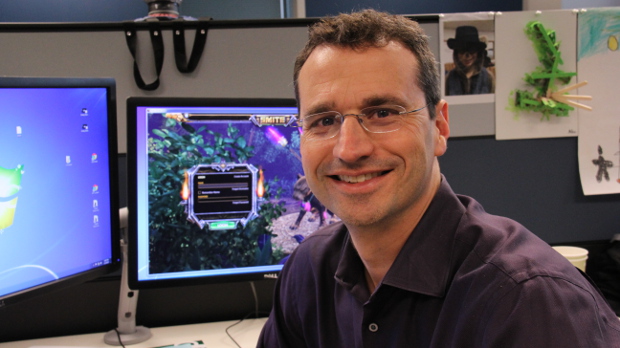
Rounding out our interviews at the 2016 Smite World Championships, we got the opportunity to talk with Hi-Rez Co-Founder and COO Todd Harris. We spoke with Todd about everything from Hi-Rez’s origins to the community's reaction to the Tribes update.
This interview will be a little different, as Auverin Morrow from GameSkinny sat in on the interview as well. Since -- as with most Hi-Rez interviews -- this was more of an open conversation than a strict, formal question-answer format, I decided to leave her questions in the final copy. The conversation will be easier to follow and will be complete.
MMOBomb: Starting at the beginning, Hi-Rez was launched 11 years ago now?
Todd Harris: Yeah, it’ll be 11 years in February.
MMOB: You said during press day that you started out working with Point of Sale systems. How did you make the transition from that to working on games like SMITE?
TH: So, I taught myself computer programing back in junior high in order to develop games, with the aspiration of one day making games. Like any good 7th grade nerd, right? And similarly, the primary founder of Hi-Rez Studios [Erez Goren] was developing games for the Atari 2600 -- if you remember that.
MMOB: I do, that was the first gaming system we owned. I played Combat with my older brother.
TH:That was good. So, he was doing that. So we had video games in our blood early. We were programmers who wanted to make games. Then the video game industry crashed. And then, separately, he and I both kind of entered the business software world. The point of sale company that I mentioned, which is a company that he started -- and I worked at -- it was very successful… it did well. And so it earned him a lot of money. He basically became a self-made millionaire.
After about twenty years doing business software he kinda woke up one day and remembered that the reason he did all that was to have enough money to make video games. Really, that’s what happened.
And so, where he could have actually retired at that point; he turned to me and said, “Hey, I think I want a video game company. Do you want to do this?”
So, it was pretty risky, honestly. I mean, just changing careers that late in life, relatively. But we were fortunate because we did have good investment from him. It wasn’t like, “Okay if we don’t make it in year one, we’re dead.” So that helped.
And we knew a bunch of really, really good programmers. And some of them were really into games. We had over twenty years we worked with all these programmers, and we basically picked-slash-asked from 200 programmers -- the best ones that happened to be into games -- if they’d want to come along with us on this journey.
So, yeah, we started with just being a really good software development crew -- and then we had to learn the art side, and the design side. So, that’s what started it.
MMOB: As I recall, there’s been a pretty big learning process for doing things like this tournament as well. I was at the launch tournament and there wasn’t as much attention to the press side of things… we were kinda there as press, but more like additional spectators.
TH: Yeah, that’s right. We didn’t even think about it that much. Like “Is someone gonna want to write about this?”
For me, the first 15 years were about learning to be a software developer. Then it was about -- oh, 7 years to learn how to be a game developer, then maybe 2 years to learn how to be not just a game developer but a game publisher -- like marketing and PR and buying ads. And then, over the last two years, not just being a developer and a publisher, but also a developer and a publisher that runs eSports. Which means not just events but running a league; and getting casters, and getting admins and getting production, and hosts. It was just a whole lot of additional stuff.
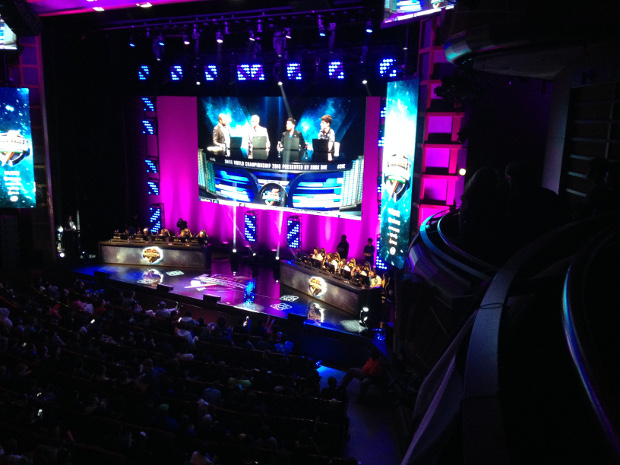
MMOB: I’ve noticed too that Hi-Rez has always pretty much handled its own league from the start, whereas Blizzard just bought MLG and Riot took back the leagues instead of having them under their control from the start.
TH: That’s right. We have, and we do, still work with some partners -- like MLG did qualify a team for the XBox competition. ESL helped us in Australia. So we do work with partners when it makes sense. But, from a strategy standpoint, because we’re so community focused -- and that’s really our main goal... I actually think of us as being in the online community and content business, and games is part of that.
What we’re really doing is building an online community at the end of the day. That’s the way I think about our mission. So, whenever possible we try to be involved. So that means we do it ourselves. We might work with groups like MLG, but we’re still involved. We don’t just hand it off.
MMOB: You see the other companies doing this now too, so it’s almost like you did the right thing to start with and the other companies are starting to figure that out.
TH: I think so. Actually, it is a little different. Some of those companies build lots of types of games -- stuff like story games. We build online action games. If you don’t have a good community, you’re not going to have a good scene.
AM: How much of your infrastructure came out of your community?
TH: Oh, Well… Even just employees, we’ve hired… say… 30 or more people. That’s just a rough guess. It’s probably more. We have, very easily, 30 full time people that were working basically on a volunteer basis -- just out of passion. I’m sure it’s much higher than that. Off the top of my head, Adam, who runs our eSports, was a Tribes competitive player, Kelly was a streamer, Lil MamaCita was a Tribes player, Rory “Drybear” was a YouTuber, Alex -- who’s in here doing press stuff -- had a Smite community site, Josh, was a streamer -- and again, just a huge Tribes player. I mean, I’m sure it would be much more than 30, but I could certainly say 30. (Writers note: there are currently about 220 employees at Hi-Rez.)
MMOB: So, being based out of Georgia, I know Hi-Rez works with the state on things like tax breaks. But I was reading recently about the movie industry here working directly with the state and local schools to train people for those kinds of jobs. Is that something Hi-Rez has considered doing? Going into the schools, instructing them on programs, that sort of thing?
TH: Yeah. We do that. So, I help with advising a curriculum. I’ve done it in the past as the Savannah College of Art and Design. I’ve done it at Gwinnett Tech and the Art Institute. We’ve talked to Georgia Tech. So advising curriculum is one thing that we’re active in.
We’re also starting to do it at the high school level. Getting high schools certified in STEM programs... We’ve helped with that.
Internships is another way. Sometimes those are actually even more valuable to the students who get to actually come, see what it’s really about, and then they get to go back and that knowledge kind of spreads organically.
MMOB: Yeah, I saw your internship opening list recently…
TH: Yeah, it’s pretty hefty. Yeah. So we definitely encourage that.
MMOB: I know that Hi-Rez also sponsors local artists… meetups, etc.
TH: Yeah, we’ll do figure drawing, photography, some things more on the techy side.
MMOB: So, also on the community side. Last year about this time, Hi-Rez had just started those videos on how to get into the video game industry… which at the time struck me as a little weird because so many game studios seem really closeted about that kind of thing. It’s like some magical mystery.
TH: Yeah, you take the secret path, and have the secret knock, and the secret handshake...
That’s the kind of thing, honestly… It does help the community, but it also benefits us. Because at the end of the day if we produce stuff that people actually seek out and it’s not advertising, that’s the best form of advertising. So if we can produce content like that, and it’s just legitimately valuable, some percentage of those folks [viewing the content] will discover Hi-Rez newly through that. They might apply to us -- which is great -- or they might download one of our games.
So, a lot of the reason we do the whacky videos we do -- and so much of that is… Number 1: just trying to be transparent with the community, to keep the community light. Number 2: it’s good marketing. It’s like an ad without being an ad.
MMOB: How much of your success with Smite would you credit to the fact that you try to be open and transparent?
TH: I think it’s a part of it, for sure. Part of it is just, obviously, MOBA is a hot thing right now. And we picked a good time to have a MOBA with a twist. So, it’s not just a copy-cat MOBA. It plays differently, it can have its own audience, different from the bigger titles out there.
So, the game deserves most of the credit. But our relationship with the community, I think does deserve a lot of the credit as well. Because it’s just, again, a different way for people to discover us.
We wouldn’t be successful if we tried to out-Blizzard Blizzard or out-Riot Riot, right? They just have their lane, and they do things that way. We need to compete on our strengths, and our strengths are working with the community and being transparent, not taking ourselves too seriously. So, I think it helps.
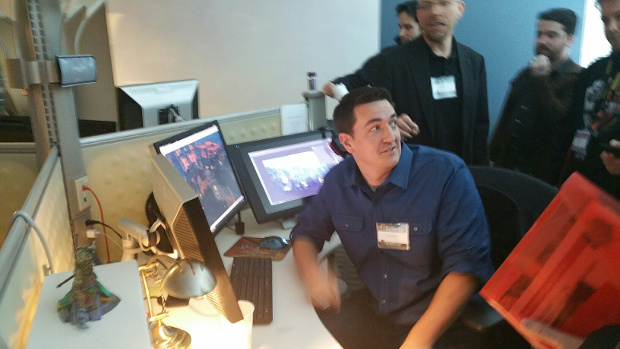
MMOB: I was talking with some of the other press people here who are a bit amazed at the level of “niceness” shown by the Hi-Rez staff. Coming to a press event for Hi-Rez is different from a lot of others in that we don’t have to really jump through hoops to get to talk to staff or grab an interview. Everything is super relaxed. Do you think some of that is due to local culture?
TH: You mean like “Southern Hospitality?” It’s a good question, actually, because there aren’t as many developers in the South.
I think some of it -- and we keep coming back to it -- but when you’re part of a company where everyone’s talking about community all the time... I think some companies are just set up to be a little more, kinda “ivory tower” around their development process -- where their artists are visionaries who aren’t to be disturbed and then the designers. And it kinda gets passed down on tablets to the players that enjoy it… We don’t tend to have that much ego, because we need the community to like us enough to help us with the game. So it’s more of a joint process.
MMOB: It even shows in your office space. I know that several people here were floored by the fact that you personally share office space with staff rather than having your own private office.
TH: Oh yeah, I mean, all of our executive team: myself, Stew, and Erez; we’re all actually in different places, but it’s an open office. We don’t have private suites or even private desks.
AM: How difficult is it to work closely with the community? Especially with the lack of trust that’s been building between gamers and developers, and all the controversies over things like broken games and disloyalty to fans?
TH: Yeah, with things like broken early access and so on. It’s not the easiest time to be a developer, I’d say.
MMOB: I’d say all the way around it’s not easy. It’s not the easiest time to be devs, it’s not the easiest time for us to be press, and it’s not the easiest time for players to be the players. Whereas Hi-Rez is very open about what you do and you admit if you screw up, and so forth, We [the gamers] turn around and we get the ultra-extreme where developers outright lie to the players. And the players are not stupid, they know they’re being lied to.
TH: That’s all true. We definitely try to have a no BS policy when it comes to that. I guess at the high level, all those various topics are legitimate discussion topics and it’s healthy for the industry to look at itself, and examine and keep progressing. But, that said, we -- games -- are the biggest media form on the planet these days.. bigger than music, bigger than movies, and it’s growing.
So, we’re doing something right. Of course, that means even more responsibility to do things even better. But it’s exciting to even be a part of that. You’re a part of that industry that is commenting on the mass media of our time.
AM: It’s such a global thing too, you’re of the only industries that are bringing people into global competition with each other.
TH: Right. And it’s such a mertocracy, right? It’s independent of gender, race, religion, language... whatever. I mean, we compete by region just so they can talk together and have servers with good ping, and then they come together and compete on the world stage.
MMOB: Right, where the internet gets everyone together in the first place, this gives you something to rally together with. Games can teach you to want to be the hero… the good person and they convey things like teamwork, which is necessary to get something done in games like this.
TH: That’s totally true. I met a guy here who wrote his college essay on Smite, and I asked him to send it to me. So he sent it to me last night and I was reading it, and it was kind of the same spirit expressed… that he got a positive value system from the game. Which is cool. It says a lot about the game. It says a lot about him.
MMOB: So you do have the Paladins tournament coming up in the Spring, and I’m assuming once the game launches you’ll be rolling into tournaments with that as well. But you also recently announced the prize limiting for Smite, will you be doing the same thing with Paladins?
TH: The philosophy is to try to help the players with a more predictable and steady income. When it comes to how we do it, and how much we do it, it just depends on the success of the game and how big the community is. We raise a lot of money through sponsorship deals and in-game sales. The more successful the game is, the more revenue we have to spread around.
So, Smite is in a pretty good position, the game is doing well. And there wasn’t really that much controversy among the teams. We spoke with them, and everyone -- except maybe Cloud 9 who took home the bulk of it last year, so I understand. But it was almost a unanimous decision among the teams that that was a better approach.
With Paladins, obviously the philosophy will be the same but we’re going to have to wait and see how it plays out. It did take a while for Smite to get to this level, so...
MMOB: It does seem like SMITE did it pretty quickly, though. This is only the second Worlds.
TH: When you look at it as a game brand, like: how long has StarCraft 2 been around, how long has Dota 2? Like, 10+ years. Counterstrike, the previous counterstrike. So yeah, when you compare it against those, just as a brand it’s phenomenally fast. But it had a long beta process, it took time to get teams developed. So, it was probably…looking way back at the beta process...3 to 4 years of cultivating it, growing teams and having time for the game to be balanced.
It’s about this time that we got sidetracked by the fact that Cloud 9 was losing terribly to Epsilon -- Hi-Rez streams the game to screens all over the venue, including the press area and Episilon was ahead 20-something to 7.
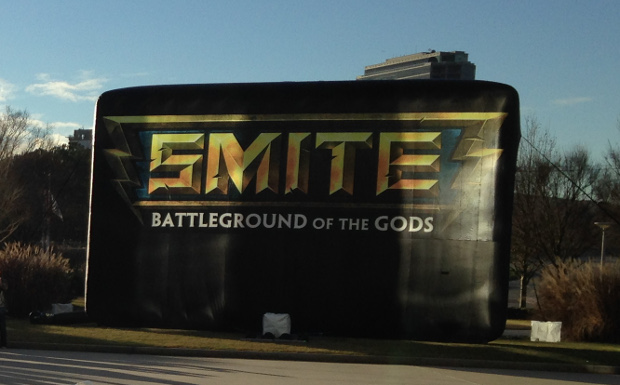
After returning our attention to the interview, Auverin had one more question for Todd.
AM: What was the community’s reaction to the Tribes update?
TH: Positive, I would say. It’s a really tough community. The Tribes community is evenly divided -- this is true -- whether Tribes 1 was the best game, or Tribes 2 was the best game, or Tribes Vengeance was the best game. Most of them did come to Tribes Ascend, most of them still do play Tribes Ascend. But they had their own issues around what could be better or not. Shawn did an amazing job working with the community.
But, that patch was not to make money, it was not really even to get new users, it was to work with that community and try to address some grievances, some things that we weren’t happy with, and just leave it in a better state. And I think the team really did succeed in that.
So, you know, more people are playing. I think twice as many people are playing. And if you look at Reddit, which is never a place of extreme positivity, in general it’s pretty complimentary.
I think that the goals that we had were met, and Shawn’s going to keep working with the community on what’s next.
AM: It’s really nice to see a community do something for the fans.
TH: Yeah, it was a little bit of both, right? We wanted to leave it in a better state…and for a company that wants to be community oriented it was kind of like a blemish. They’re a tough crowd.
MMOB: That’s the thing with gamers though. They can get really angry sometimes, but it comes from a place…
TH: Yeah, they hate because they love. They’re such a passionate crowd. Honestly, they hate because they care.
And with that, we thanked Todd for his time before adjourning to watch the next match.
MMOBomb would like to thank Todd for taking the time to chat with us. Todd, can be followed on Twitter @ToddAlanHarris.
We hope to do it again soon.If you missed our previous interviews with Rory Newbrough and Chris Larson, be sure to check them out.
Related Articles
About the Author

QuintLyn is a long-time lover of all things video game related will happily talk about them to anyone that will listen. She began writing about games for various gaming sites a little over ten years ago and has taken on various roles in the games community.
More Stories by QuintLyn BowersRead Next
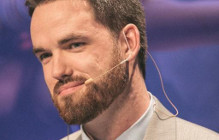
At the Smite World Championships, we got the chance to sit down with several members of the Hi-Rez team.
You May Enjoy

The components are earned by completing a series of Tactical Alerts.

The Trials will reward players with items from the great dragon’s hoard.
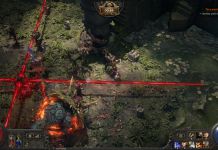
The patch also addresses Xbox game share feature issue.

Across the time he worked on some of Blizzard’s best-known games.
They still pretend Tribes lost support because it wasn't popular when in reality they simply didn't make any new content, including cash shop stuff, a lot of people wanted to buy more stuff but had nothing to spend on
btw, also the same people that tried to censor when a video showed the game was tracking the pc even when not opened... that doesn't seem like transparency at all